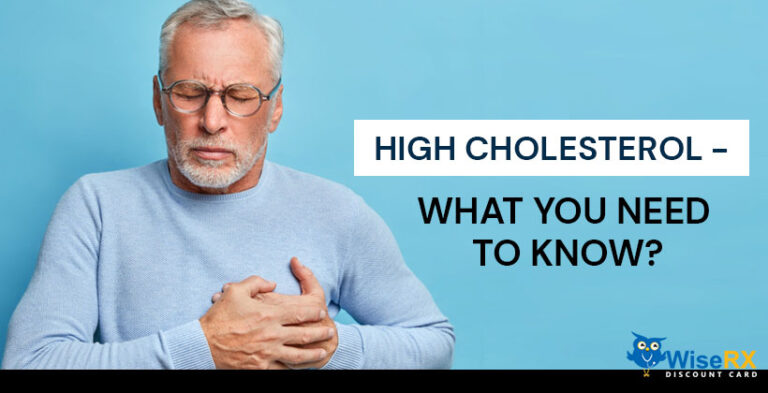
Things You Must Know About High Cholesterol
Cholesterol is a type of lipid. It is a fatty, wax-like substance that the liver naturally produces. It is essential for the formation of cell membranes, vitamin D, and specific hormones.
Cholesterol doesn’t get dissolved in water, so it can’t travel through your blood on its own. It is your liver which then produces lipoproteins that help to transport cholesterol. Lipoproteins are made from protein and fat. They carry triglycerides and cholesterol (another type of lipid) through your bloodstream. The two major forms of lipoprotein are high-density lipoprotein (HDL) and low-density lipoprotein (LDL).
If your blood contains a bit too much LDL cholesterol, it is known as high cholesterol. If you leave it untreated, high cholesterol may lead to many health problems, including stroke or heart attack.
High cholesterol typically causes no symptoms. It is why it is essential to get your cholesterol levels to check daily.
‘Bad cholesterol’ or LDL cholesterol
Low-density lipoprotein (LDL) is also called ‘bad cholesterol.’ It carries cholesterol to your arteries. If your levels of LDL cholesterol are too high, it may build up on the walls of your arteries. The buildup is also known as cholesterol plaque. The plaque can narrow your arteries, raise your risk of blood clots, and limit your blood flow. If a blood clot blocks an artery in your brain or heart can cause a heart stroke or attack.
According to the CDC, over one-third of American adults have elevated levels of LDL cholesterol.
‘Good cholesterol’ or HDL cholesterol
High-density lipoprotein (HDL) is sometimes called ‘good cholesterol’. It helps to return LDL cholesterol to your liver to be removed from your body. It helps prevent cholesterol plaque from building in your arteries.
When you have healthy levels of HDL cholesterol, it helps to lower down the risk of stroke, heart disease, and blood clots.
Triglycerides, a different kind of lipid
Triglycerides are known as another type of lipid. They are different from cholesterol. While your body may use cholesterol to build up cells and certain hormones, it uses triglycerides as a source of energy.
When you eat more calories than your body can use right away, it converts those calories into triglycerides. It stores triglycerides in your fat cells. It also uses lipoproteins to circulate triglycerides through your bloodstream.
If you eat more calories than your body can use, your triglyceride levels may get high. It may raise your risk of several health problems, including stroke and heart.
Your doctor may use a simple blood test to measure your triglyceride levels, as well as cholesterol levels.
Risk factors for high cholesterol
You might be at a higher risk to develop high cholesterol if you:
- Have hypothyroidism, kidney diseases, or diabetes
- Have a family history of high cholesterol
- Smoke tobacco products
- Don’t exercise regularly
- Eat an unhealthy diet
- Are obese or overweight
- People of all ethnicities, genders, and ages can have high cholesterol.
Complications of high cholesterol
If you leave high cholesterol untreated, it can cause plaque to build up in your arteries. Over time, the plaque can narrow down your arteries, and the condition is known as atherosclerosis.
Atherosclerosis is a severe condition. It can limit the blood flow through your arteries. It also raises the risk of developing dangerous blood clots.
Atherosclerosis may result in many life-threatening complications like:
- Chronic kidney disease
- Peripheral vascular disease
- High blood pressure
- Angina (chest pain)
- Heart attack
- Stroke
How to lower cholesterol
If you are suffering from high cholesterol, your doctor may recommend lifestyle changes that help to lower it. For example, they may recommend changes to your daily routine, exercise habits, or diet. If you smoke tobacco products, they will likely advise you to quit.
Doctors may also prescribe medicines or other treatments that may help to lower down cholesterol levels. In few cases, they may also refer to a specialist for more care.
Lowering cholesterol levels through diet
If you want to maintain and achieve healthy cholesterol levels, your doctors may recommend changing your diet. They may advise you to:
- Avoid junk food and fast food
- Opt for roasted, grilled, steamed, broiled, and baked food instead of fried foods
- Eat a wide variety of high-fiber foods, like whole grains, vegetables, and fruits.
- Choose lean sources of protein like legumes, fish, chicken.
- Limit your intake of foods that are high in trans fat, saturated fats, and cholesterol
Prevent high cholesterol
Genetic risk factors for high cholesterol cannot be controlled. However, you can manage the lifestyle factors.
To lower your risk of developing high cholesterol:
- Don’t smoke
- Exercise regularly
- Maintain healthy weight
- Avoid excessive alcohol consumption
- Eat a nutritious diet that is low in animal fats, cholesterol, and high in fiber.
Conclusion
If you leave high cholesterol untreated, it may cause serious health problems and even death. However, proper treatment can help you to manage this condition.
If you want to treat high cholesterol, ask your doctor to test your cholesterol levels. The above points will help you understand better about high cholesterol.
Doctors may suggest medicine and taking multiple medicines in a day might burn a hole in your pocket. To avoid such a situation, you can use a free prescription discount card to buy your medications at discounted prices.

